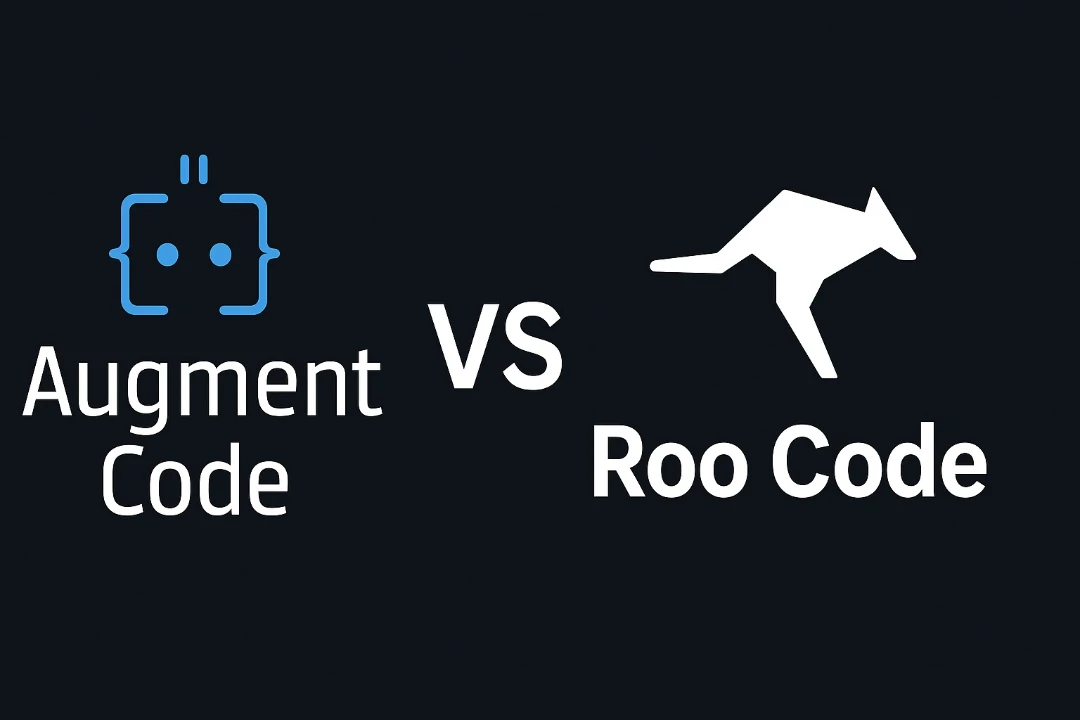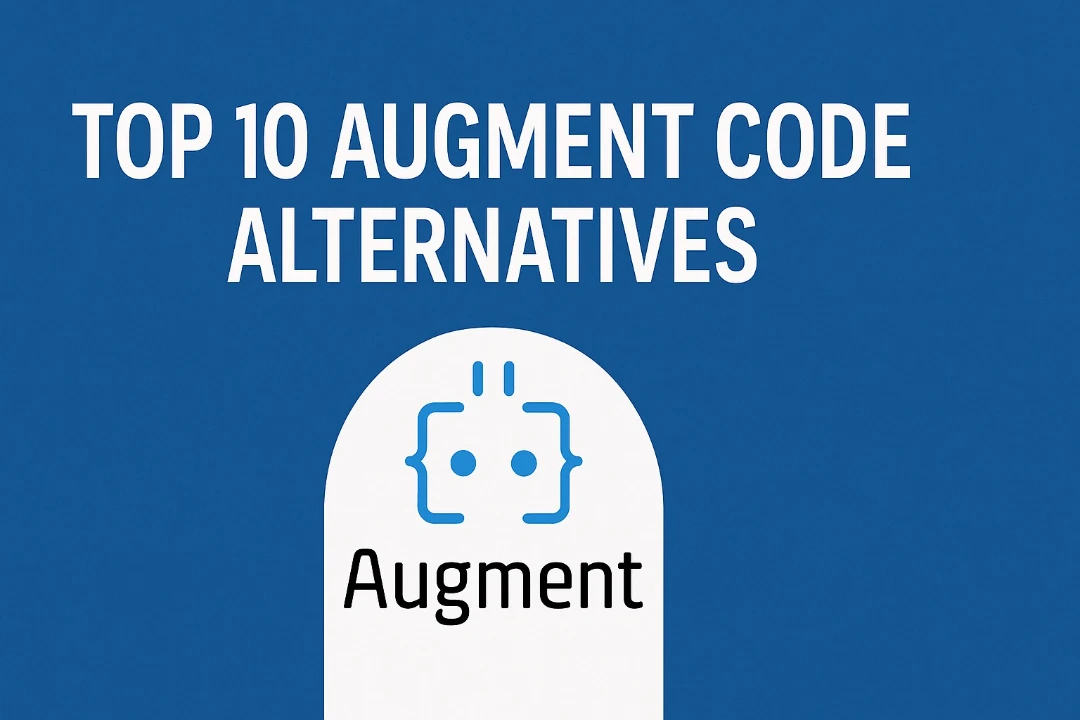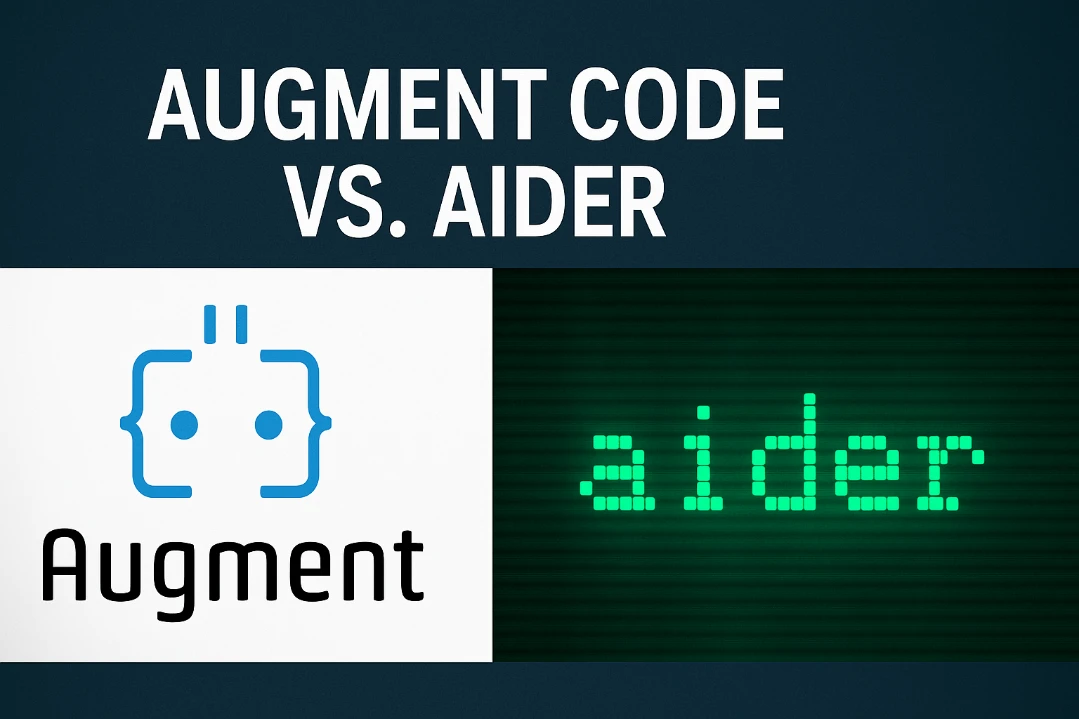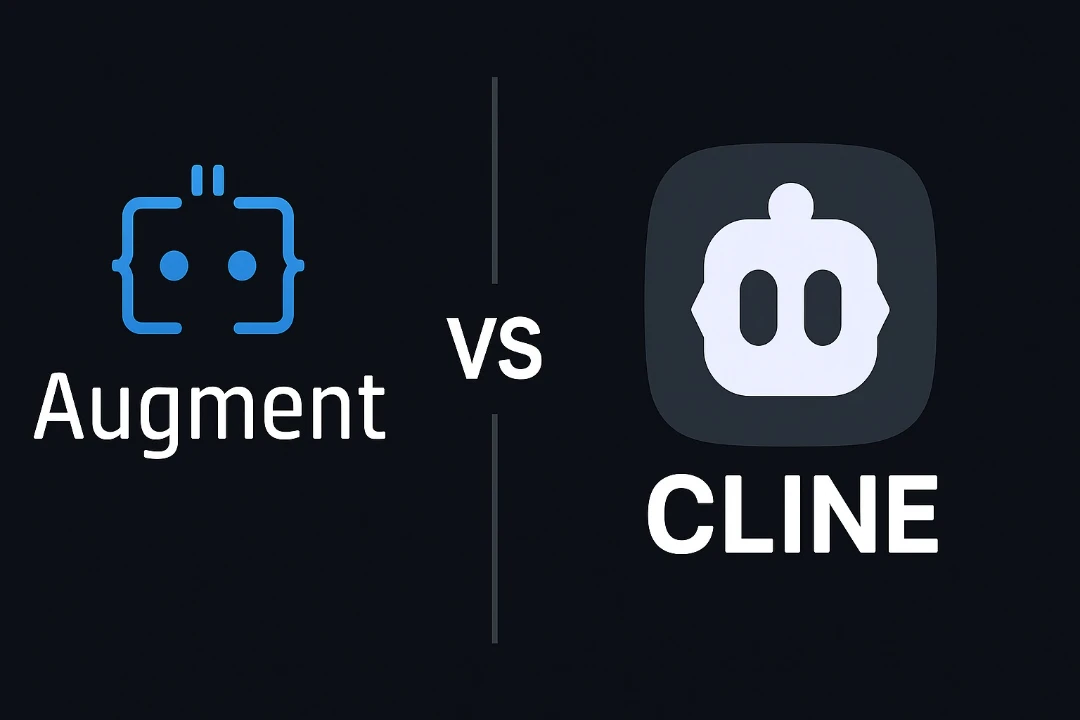
Augment Code vs Roo Code: Battle of Next-Gen AI Coding Assistants
Augment Code vs Roo Code: Battle of Next-Gen AI Coding Assistants
As AI-powered coding assistants continue to revolutionize developer workflows, two powerful contenders have emerged as leaders in the field: Augment Code and Roo Code. Both tools promise to enhance productivity, streamline complex tasks, and integrate AI capabilities directly into your development environment. But which one is right for your specific needs?
This comprehensive comparison will dive deep into the strengths, limitations, and unique features of each platform to help you make an informed decision. Whether you're working solo on small projects or part of a large enterprise team managing complex codebases, understanding the nuances between these tools can significantly impact your development experience.
Background and Evolution
Augment Code: The Enterprise-Focused Powerhouse
Augment Code emerged as a powerful AI coding assistant designed specifically for professional developers working with large, complex codebases. Launched in 2024 by a team with deep expertise in machine learning and systems engineering (with alumni from Google, Meta, NVIDIA, and other tech giants), Augment quickly positioned itself as an enterprise-grade solution.
AI-powered coding assistant designed for development teams with deep codebase understanding
The platform raised significant funding, including a $227 million Series B at a $977 million valuation, backed by prominent venture firms like Sutter Hill Ventures and Index Ventures. This financial backing reflects Augment's ambition to transform how professional teams interact with large codebases.
Augment's core philosophy centers around three key principles:
- Deep understanding of entire codebases (including dependencies and best practices)
- Enterprise-ready security and compliance
- Performance optimization for professional developers
Roo Code: The Flexible, Developer-Centric Fork
Roo Code (previously known as Roo Cline) began its journey as a fork of Cline, another popular AI coding assistant. What started as an extension of existing capabilities has evolved into a distinct and powerful tool with its own identity. As an open-source project, Roo Code has benefited from community contributions and rapid iteration.
Open-source autonomous AI coding agent with extensive customization and multi-model support
Roo Code's evolution has been driven by a focus on:
- Flexibility and customization for individual developer workflows
- Multiple specialized modes for different development tasks
- Broad model support to maximize cost efficiency and performance
- Direct integration with the VS Code environment
With over 368,000 installations as of early 2025, Roo Code has built a substantial user base, particularly among individual developers and smaller teams seeking an adaptable AI assistant that can be tailored to specific needs.
Core Features Comparison
When evaluating AI coding assistants, it's crucial to understand how their key features compare in real-world usage scenarios.
Code Understanding and Analysis
Augment Code:
- 200K token context window for comprehensive codebase understanding
- Built-in indexing engine that recognizes code patterns and structures
- Deep comprehension of dependencies and project architecture
- Specialized in understanding large, complex codebases
- "Memories" feature that learns from your coding style over time
Roo Code:
- Smaller context window but efficient file handling
- Strong file and project navigation capabilities
- File system operations with natural language commands
- Focuses on practical code manipulation rather than deep indexing
- Adapts to projects of various sizes with efficient context management
Key Difference: Augment Code excels at enterprise-scale projects with extensive codebases where deep understanding of system architecture is crucial, while Roo Code offers more flexible, task-focused code manipulation that works well across projects of different sizes.
Code Generation and Editing
Augment Code:
- Context-aware completions that reflect your code style and dependencies
- "Next Edit" feature for understanding ripple effects of code changes
- Codebase-wide suggestions based on recent edits
- Specialized in making consistent changes across multiple files
- Optimization for production-level code quality
Roo Code:
- Direct file creation and editing with natural language instructions
- Fast edit application system
- Supports multiple simultaneous editing tasks
- Provides clear diffs and edit previews
- Excels at quick implementations and prototyping
Key Difference: Augment Code focuses on high-quality, consistent edits that maintain codebase integrity, while Roo Code prioritizes speed and flexibility, making it excellent for rapid development and experimentation.
Interface and Integration
Augment Code:
- Available for VS Code, JetBrains IDEs, Vim, GitHub, and Slack
- Seamless integration with existing workflows
- Specialized Slack integration for team collaboration
- Chat interface for natural language interaction
- Enterprise-oriented team management features
Roo Code:
- VS Code extension with deeply integrated experience
- Multiple specialized modes (Code, Architect, Ask, Debug)
- Custom modes capability for specialized workflows
- Terminal command execution with permission controls
- Browser automation for testing and debugging
Key Difference: Augment Code offers broader platform support and enterprise collaboration features, while Roo Code provides deeper VS Code integration with specialized operational modes.
Operational Modes and Customization
Augment Code:
- Focused on consistent experience across interfaces
- Main operational modes: Chat, Completions, Next Edit
- Less emphasis on specialized modes, more on consistent quality
- Standardized approach for enterprise adoption
- Team-oriented settings and configurations
Roo Code:
- Multiple specialized modes (Code, Architect, Ask, Debug)
- Unlimited custom modes for specific tasks and roles
- Per-mode configuration of tools and permissions
- Customizable prompts and instructions for each mode
- Project-specific MCP (Model Context Protocol) configuration
Key Difference: Roo Code offers significantly more customization and specialized modes, allowing developers to create tailored experiences for different tasks, while Augment Code prioritizes a consistent, high-quality experience across fewer, well-defined modes.
AI Models and Performance
Augment Code:
- Verified top performance on coding benchmarks (65.4% on HumanEval)
- Proprietary optimization for code-specific tasks
- Consistent, reliable performance on complex codebases
- Focus on quality of suggestions over raw speed
- Enterprise-grade reliability
Roo Code:
- Supports a wide range of AI models
- Compatible with OpenAI, Anthropic, Google Gemini, and local models
- OpenRouter integration for cost optimization
- Flexibility to choose models based on task requirements
- Speed-optimized for interactive development
Key Difference: Augment Code focuses on consistent, high-quality performance with optimized models, while Roo Code offers greater flexibility in model selection and cost optimization.
User Experience and Workflow Integration
The day-to-day experience of working with an AI assistant significantly impacts productivity and satisfaction.
Learning Curve and Onboarding
Augment Code:
- Designed for professional developers
- Straightforward integration into existing workflows
- Minimal disruption to established processes
- Clear documentation and enterprise support
- Gradual expansion of features as users become more comfortable
Roo Code:
- Initially simple but with extensive customization options
- More features to learn and configure
- Steeper learning curve for advanced capabilities
- Excellent community documentation and support
- Rewards investment in learning with greater productivity
Key Difference: Augment Code offers a smoother transition for teams with minimal workflow disruption, while Roo Code requires more initial learning but provides greater rewards for those who master its extensive capabilities.
Daily Development Workflow
Augment Code:
- Seamless integration with team collaboration tools
- Consistent experience across different parts of the workflow
- Excels at maintaining context across complex projects
- Particularly strong for refactoring and system evolution
- Built for long-term development relationships
Roo Code:
- Highly adaptive to individual developer preferences
- Excellent for rapidly implementing new features
- Strong support for diverse development tasks
- Specialized modes optimize for specific activities
- Ideal for developers who frequently switch between different types of tasks
Key Difference: Augment Code integrates more seamlessly into structured team workflows and complex projects, while Roo Code adapts more readily to individual developers' varied tasks and preferences.
Real-World Performance
How do these tools perform in actual development scenarios? Let's examine their strengths and limitations in real-world usage.
Large Codebase Handling
Augment Code:
- Purpose-built for enterprise-scale codebases
- Excels at understanding complex dependencies
- Maintains consistent performance across large projects
- Special optimizations for multi-repository architectures
- Excellent at onboarding developers to unfamiliar code
Users report that Augment Code particularly shines when working with codebases exceeding 100,000 lines, where its deep indexing and understanding capabilities provide significant advantages.
Roo Code:
- Handles large projects through efficient context management
- More manual segmentation required for very large codebases
- Performance can vary based on configuration and model selection
- Excellent file navigation helps manage complexity
- Good at targeted interventions in specific areas of large projects
Roo Code users note that while it can work with large codebases, it requires more strategic use of context and tools compared to Augment Code's automated approach.
Development Speed and Productivity
Augment Code:
- Excels at understanding existing code and maintaining consistency
- Particularly strong for maintenance and evolution of established systems
- High-quality suggestions reduce time spent on revisions
- Team-wide productivity improvements through shared context
- Reported 27% reduction in debugging time in enterprise settings
Roo Code:
- Faster implementation of new features from scratch
- Rapid prototyping capabilities
- Quick results for well-defined tasks
- Excellent for iterative development
- Particularly strong at automating repetitive coding tasks
Developers report that Roo Code often feels "faster" for individual tasks, while Augment Code provides more consistent, high-quality assistance that reduces overall project time through fewer errors and revisions.
Cost and Resource Considerations
Understanding the economic implications of these tools is crucial for both individual developers and organizations.
Pricing Models
Augment Code:
- Tiered pricing starting at approximately $60 per active user per month
- Usage-based model with no named seats
- Enterprise pricing available for larger teams
- Free plan available for open-source development
- Predictable costs through flat-rate structure
Roo Code:
- Free installation with BYOK (Bring Your Own Key) model
- No subscription costs beyond API usage
- Token consumption varies based on task complexity
- Support for free and low-cost models like Gemini
- Cost optimization features for reduced token usage
Key Difference: Augment Code uses a more traditional SaaS pricing model with predictable costs, while Roo Code's BYOK approach offers potentially lower costs but requires more active management of API usage.
Resource Utilization
Augment Code:
- Optimized for efficient token usage
- SOC 2 Type II certified for security compliance
- Enterprise-grade privacy protection
- Consistent resource utilization
- Predictable performance patterns
Roo Code:
- Variable resource usage based on configuration
- Potential for high token consumption on complex tasks
- Custom modes can help optimize resource allocation
- Support for local models reduces external API costs
- Flexible resource management for different scenarios
Key Difference: Augment Code offers more predictable, enterprise-oriented resource management, while Roo Code provides flexible options that can be optimized for individual scenarios.
Ideal Use Cases
Different development contexts call for different tools. Here's where each assistant shines:
When to Choose Augment Code
Enterprise Development Teams
Augment Code's team-oriented features, security compliance, and consistent experience make it ideal for large organizations with complex codebases and multiple development teams.
Complex System Maintenance and Evolution
For projects involving legacy code maintenance or significant system evolution, Augment Code's deep understanding of codebases and relationships between components provides substantial advantages.
Cross-Team Collaboration
The Slack integration and shared context capabilities make Augment Code excellent for environments where multiple developers need to collaborate on the same codebase.
Onboarding to Large Projects
New team members can get up to speed quickly with Augment Code's ability to explain complex systems and provide contextual understanding of large codebases.
Security-Critical Development
Organizations with strict security and compliance requirements benefit from Augment Code's enterprise security features and SOC 2 Type II certification.
When to Choose Roo Code
Individual Developers and Small Teams
Roo Code's flexibility, customization options, and cost efficiency make it particularly well-suited for individual developers and small teams.
Specialized Development Workflows
Developers with unique or specialized workflows benefit from Roo Code's custom modes and extensive configuration options.
Rapid Prototyping and New Feature Development
Roo Code excels at quickly implementing new features and prototypes from natural language descriptions.
Multi-Role Development
For developers who frequently switch between different types of tasks (architecture, coding, debugging, etc.), Roo Code's specialized modes provide optimized experiences for each context.
Budget-Conscious Projects
Roo Code's support for various models and cost optimization features make it attractive for projects with tight budget constraints.
User Feedback and Testimonials
Real-world experiences from developers provide valuable insights into how these tools perform in practice.
Augment Code User Experiences
Enterprise Developer at Webflow:
"The fact that Augment doesn't make you think about context means you can ask questions about unknown unknowns and get really insightful answers back."
Engineering Manager at Pigment:
"I was super blown away because it allows you to say, 'Hey, Augment, where is this feature implemented?' And it can surface the frontend code, the backend code, and also the SQL migration."
VP of Engineering at Collective:
"Augment Code's seamless integration and intuitive suggestions have led to a remarkable increase in productivity and team happiness. It was one of the fastest adopted tools within the team as compared to any coding assistant Collective has tried."
Common Praise Points:
- Superior understanding of large codebases
- High-quality suggestions requiring minimal modification
- Excellent for team collaboration
- Strong security and privacy features
- Reduction in onboarding time for new team members
Common Criticism Points:
- Higher cost than some alternatives
- Less flexibility for individual customization
- Steeper learning curve for maximum benefit
- Less support for very specialized workflows
Roo Code User Experiences
Backend Developer:
"After testing both Cline and Roo Code, I've found Roo Code's custom modes essential for my workflow. I created specialized modes for testing, documentation, and frontend development that dramatically improved my productivity."
Independent Developer:
"The flexibility to choose between different AI models based on what I'm doing has saved me significant money. I use cheaper models for simple tasks and reserve the more powerful ones for complex architecture decisions."
Full-Stack Developer:
"Roo Code's browser automation capabilities have revolutionized how I test my web applications. It can interact with my sites, find bugs, and even suggest fixes - it's like having a QA engineer built into my editor."
Common Praise Points:
- Excellent customization options
- Cost efficiency through model selection
- Fast editing and implementation
- Strong community support
- Continuous improvement through open-source contributions
Common Criticism Points:
- Higher token consumption on some tasks
- More complex configuration required for optimal performance
- Less consistent experience across different models
- Requires more active management than some alternatives
Future Outlook
The AI coding assistant landscape continues to evolve rapidly. What might the future hold for these platforms?
Augment Code's Trajectory
Augment Code appears to be developing in the direction of:
- Deeper integration with enterprise development pipelines
- Enhanced capabilities for large-scale system understanding
- Improved collaboration features for distributed teams
- Additional security and compliance certifications
- Advanced code quality and performance optimization tools
Recent announcements suggest a focus on expanding Next Edit capabilities and further improving context handling across massive codebases.
Roo Code's Development Path
Roo Code seems to be evolving toward:
- Even greater customization options
- Additional specialized modes for niche development tasks
- Improved integration with external tools via MCP
- Enhanced support for cutting-edge AI models
- Performance optimizations for faster response times
The open-source nature of Roo Code suggests continued community-driven innovation with rapid adoption of emerging technologies.
Industry Trends Affecting Both Tools
Several broader trends will likely influence both assistants:
- Increasing focus on generative AI safety and reliability
- Greater integration with software development lifecycles
- Enhanced multilingual capabilities
- Improved understanding of specialized domains and frameworks
- More sophisticated project-wide refactoring capabilities
Conclusion: Making Your Choice
The decision between Augment Code and Roo Code ultimately depends on your specific development context, team structure, and priorities.
Choose Augment Code if you value:
- Enterprise-grade security and compliance
- Deep understanding of large, complex codebases
- Team collaboration and shared context
- Consistent, high-quality assistance
- Seamless integration with multiple platforms
Choose Roo Code if you prioritize:
- Flexibility and extensive customization
- Cost efficiency and model selection
- Specialized modes for different development tasks
- Rapid implementation and prototyping
- Community-driven innovation and open-source benefits
Many developers find value in starting with Roo Code for personal projects and smaller teams, while larger organizations with complex requirements often gravitate toward Augment Code's enterprise-focused capabilities.
Whichever tool you choose, the integration of AI assistance into your development workflow represents a significant step toward enhanced productivity and creativity in software development.
Getting Started
Ready to explore these powerful AI coding assistants?
To begin with Augment Code:
- Visit augmentcode.com
- Sign up for a free trial or open-source plan
- Install the extension for your preferred IDE
- Connect your account and start coding
To start with Roo Code:
- Open VS Code
- Search for "Roo Code" in the Extensions marketplace
- Install the extension
- Configure your preferred AI provider
- Explore the different modes and features
We recommend experimenting with both tools to discover which best complements your development style and project requirements.


